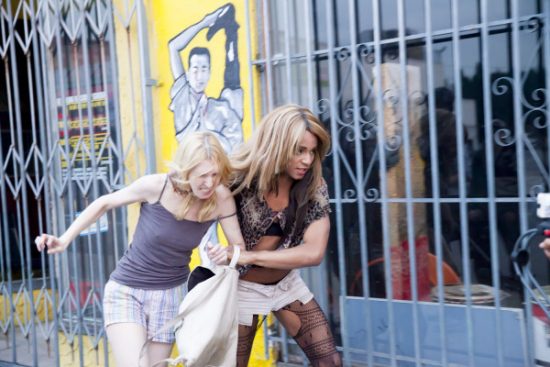Review: Tangerine
Tangerine made me feel something. Shot on an iPhone 5, this is as cinematic as any movie this year. A spiritual sequel to the tumbling camera/Instagram filter/slam-slam editing aesthetic of Spring Breakers, this one of those “day in the life of” movies that so easily grow stale and tiresome. Really, this is a movie that shouldn’t work—conventionally speaking, the script is loud, uneven, doesn’t have focus, and has an absurd story that sounds like a punchline to a joke you were never told. Amazingly, Tangerine doesn’t just work, it’s one of the best movies of the year. It even earns the cliched phrase: You’ve never seen anything like this before. Honestly, Tangerine runs so hot it almost set my screening ablaze. Okay, that might be hyperbole, but only just. A few minutes into this movie I was sweating—my heart was beating, my eyes were wide open, and I was laughing, excited, repulsed, in a trance. Tangerine is exhilarating.
We follow two transgendered prostitutes through a day in their life. A few hours, really. Maybe twelve. They have conflicts, but to our eyes they seem petty, pathetic, and sometimes sad. To them, Sin-Dee Rella (Kitana Kiki Rodriguez) and Alexandra (Mya Taylor), it might as well be life and death. There’s no grand, intricate, spiraling narrative trajectory. It’s loose, flowing, but most importantly real. There’s a third, weaker strand (that eventually connects to the main plot) of an Armenian cab driver named Razmik (Karren Karagulian), who struggles to be any happier in domestic life than Rella and Alexandra are on the streets. As a work of art so easy to politicize, Tangerine brilliantly sidesteps any such temptation.
We occupy less than 90 minutes—short movie, meaning you have no excuse not to watch it (and it’s on Netflix)—with Rella and Alexandra, but in that time we learn to like, love, and hate them. They’re likable people who do unlikable things, and the lurid reality of their daily work phases them with exactly the same impact we plop onto a wheely chair in the fifth row cubicle. Alexandra gets paid $40 to play with a man’s testicles while he finishes himself off—she sighs and complains it’s not happening fast enough exactly the way a coworker whines the fax machine isn’t working again. Rella has two dollars to her name, and two minutes after we meet her she already spent half of it on a donut. But her main concern isn’t scoring cash—Alexandra lets it slip Rella’s “boyfriend” (and, later we find out, Pimp) was “testing out the merchandise,” i.e. cheating. Enraged and recalling every utterance of “hell hath no fury like..” she stomps through ghetto L.A. sidewalks in heels and fishnets like she’s Stallone on a mission in Rambo. She’s out to take names.
Rella’s taking of names is among the movies more problematic sections, where beatings and violence take on a casual “whatever” tone that’s largely played for laughs. Tangerine is a comedy-drama and wins chuckles easily, but it made me undeniably uneasy I was invited to laugh at a woman’s suffering. Especially one who was seemingly no more ‘wrong’ than Rella was herself. Similar complaints were thrown at The Hateful Eight, but Tarantino plays his movies as cartoon. This, on the other hand, is reality on an acid trip, blooming with dirty yellows and oranges and a camera that never stops moving. Culpability plays realer than in a Tarantino, and payoffs later on are designed to justify it but really don’t (the way the whole movie “pays off” is in fact the least satisfying part of the whole product).
Alexandra eventually has had enough of Rella’s juvenile tantrums and goes on a journey of her own—her dream is to sing. When she finally does it recalls the same sad poignancy of Isabella Rosellini singing inBlue Velvet. Tangerine has a texture and richness to it that writer-director Sean S. Baker should be immensely proud of, especially since the budget was less than most houses. The camera freely follows character to character, the iPhone 5’s lightness and mobility taken full advantage of. It tracks parallel the way a camera might on 50 feet of dolly track, or follows an actress the way a regular handheld camera could, or steadicam. Limited only by his own imagination of where to put the camera, each shot feels loose and athletic, precise but improvised. Baker’s camera follows their lives similarly to how we follow our own.
That immediacy, tenderness, and, yes, intimacy humanizes characters most of us would never meet. Rella doesn’t really talk fast so much as she seems over-caffeinated, barks at onlookers who clearly identify her as a “tranny prostitute” and has shades of self-evident ghetto to her look. Amazingly, before the film ends you can imagine yourself having a conversation with her. Alexandra and Rella leap off the screen with realism, amazing since Rodriguez and Taylor don’t give obviously amazing performances. Using regular standards of appraisal, their lack of exactness might seem unprofessional. Here, it’s exactly whatTangerine needs.










